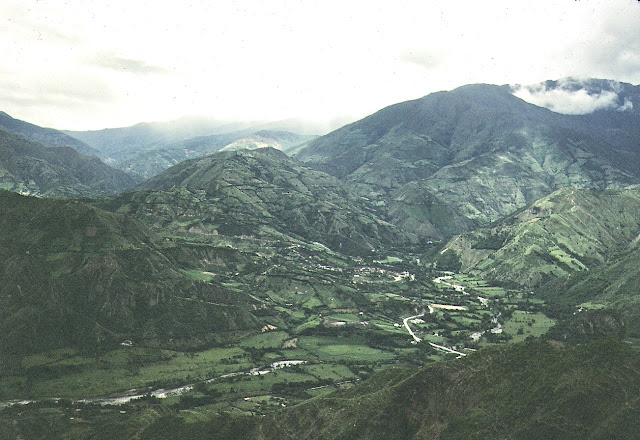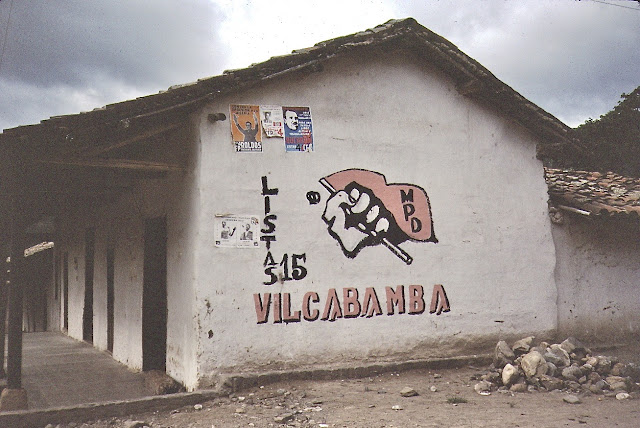Vilcabamba, Ecuador April 12-18, 1979
This morning Michel and I caught a ride from Saraguro to Loja with a group of three young Latinos, riding in the back of their pick up truck along with a rickety wooden table and four chairs. We hung onto the table legs to keep it from rattling around on the bumpy dirt road. I kept wishing the table was just a little bigger and higher so that it would act as a shelter from the chill and damp as we drove through the high, mist enveloped mountains. There was enough water in that mist to make everything soggy. When it really started to rain in earnest I took cover under my trusty yellow poncho, trying to keep me and my pack as dry as possible. Michel’s hat and thick woollen poncho gave him pretty good protection; in any event he didn’t care much for my plastic poncho and wasn’t interested in my offers to share. About half-way to Loja we finally descended into a valley, that was somewhat warmer and drier. Within half an hour, to Michel’s great relief, I was able to fold up my poncho and stow it safely away in a pocket of my pack.
Loja wasn’t much of a town, and neither of us wanted to stay there, so we sat in a dingy café drinking tea for a couple of hours waiting for a ‘bus’ to Vilcabamba that we were told would be coming – some time that day. We weren’t at the ready when the bus finally arrived; we had to pay for our tea and gather our gear together. So by the time we got to the bus it was chock full of people, bags, baskets, children and chickens. The ‘bus’ was a kind of oversized milk-wagon with a cab and a large bed. There were five or six rows of wooden benches reasonably well secured across the front of the bed and a big open area in the back. The ‘seating area’ was covered with a wooden roof; the back was pretty much open, with a half-hearted attempt at a tarp, well tattered.
We squeezed ourselves into a couple of seats and sat down to watch the ongoing free-for-all. Men, women and children poured in from both sides and the back, climbing up onto the roof, passing bundles, baskets and babies back and forth over one another’s heads, pushing and shoving and trying to find places to sit or stand. There were a few confrontations over seats. Ever the gentleman, Michel agreed to give his seat to a mama and baby, and ended up standing in the back – the ‘cattle compartment’ – with most of the rest of the men. The ride was uncomfortable and dusty. Every time we stopped, which was often, the bus was enveloped in a cloud of dust. Everyone covered their noses and mouths with scarves, handkerchiefs, sweaters and jackets, but the fine dust settled and stuck, transforming us all into terra cotta ghosts – with very parched throats.
One of the many stops we made along the road.
Finally we see Vilcabamba, nestled among the mountains.
Getting closer....
The town of Vilcabamba is very small – a couple of blocks in any direction – nestled cozily in the mountains. The town is famous for the longevity of its inhabitants – many locals live to 100 and beyond – apparently thanks to the clean air and water in the valley. Certainly it is one of the most beautiful places I’ve been so far. After getting ourselves settled at one of the only pensions in town we went out for a leisurely stroll in the mountains. As evening approached we were treated to a fabulous double rainbow, hanging, hovering, like a chimera, over the misty purple-green mountains. The sky opposite glowed orange and pink. A local came out of his hut to wash as we were standing nearby, gazing at the rainbow. We wished him good evening and commented on the beautiful rainbow – in Spanish an ‘arco iris’. “Ocurren todos los dias” he said, “todos los dias.” Imagine living in a place where there are rainbows every day! Maybe that’s the real reason for people’s longevity here – lucky rainbows....
The next morning we set off on foot down the road that leads towards Loja in search of a ‘holy man’ who sells honey. We traipsed through a forest of coffee, banana and orange trees, over a couple of rickety bamboo fences, and up a stone path to a small adobe hut where we were greeted first by a snuffling black pig (is that a pig or a dog?), and then three yelping dogs, which I was glad to see were chained. An elderly woman appeared in the yard and told us it was her brother who sold the honey. She opened a big iron gate which lead to a series of paths and pointed – somewhat vaguely – in what we understood was the direction of his casa. It wasn’t clear which of the paths we were meant to take, but we finally found our way, through old corn fields with dried-out stalks that seemed, for some reason, to attract butterflies, to the brother’s casa.
Old corn field...
Two Indian men were standing outside; a woman in the doorway. Knowing what we had come for, one of the men greeted us with: “Miel no hay. La semana proxima hay.” (There’s no honey. There’ll be honey next week.) And no, they didn’t know where we could get any honey, but maybe ‘arriba’ (above, up the hill) or ‘alla’ (further on). This offered with the customary vague wave of an arm to indicate a general, very general, direction. Of course we had no idea how far we might have to go, or if there would be any honey there now, or in the future – or ever. So we decided to walk back, and took a much less-traveled path instead of the road. We walked past mud homes with tile rooves, doors open, men women and children sitting on porches picking nits out of one another’s hair. A few were whittling wood, or just sitting day-dreaming. A leafy green path branched off to the left – why not? We were rewarded with fresh-picked oranges, the first time I’ve ever picked oranges right off the tree and eaten them. Wow! Now that’s an orange! Or, as Americans would say, “O-range.” We soon found ourselves wandering through a dense coffee-banana-orange plantation with beautiful flowers, mosses and lichens, lots of butterflies and birds – birds singing their little hearts out. It felt like paradise.
The rocks above us look very much like huge human heads, and some animals. Some appear to have features, like eyes, carved into them. Could they have been carved? Vilcabamba is also (in addition to its claim for longevity) known as ‘the sacred valley’. Perhaps these mountains have something to do with that lore... .
We got back to town before noon and sat in the café drinking coffee. An ‘older’ gringo (late 30’s?) came by to visit. He seemed nervous, and kept fingering a tin of tuna he’d just bought for lunch. He told us he came down here every few years to get in shape, climbing mountains and jogging. He told us which mountains we could climb, and who we could visit. Apparently there’s a crazy older gringo who lives with a 22 year old girl just outside of town and claims to direct the world’s leaders with mental telepathy. Or we could visit Glen and Martha who have a farm outside of town, have a baby, and aren’t married. He finished his diatribe by informing us about what we could buy at the market, how sick he had been yesterday after eating bad meat, and how he never eats in restaurants because he doesn’t want to take any chances.
Building across from our usual cafe...
One day is melting into another here. We walk, mostly in the mountains; we talk, mostly about traveling; and we drink endless café con leches as we watch the goings on in this quiet little town. This morning we walked up the mountain directly behind our hotel. From a distance it resembles a giant face, looking up. The trail went straight up a ridge line, through stubble, bushes, vines, cactii, and small trees, some with ferocious-looking spikey red thorns, to the cross – there is always a cross – about an hour up. The view was fantastic, and the butterflies amazing. They came so close, almost like they wanted to light on our heads or shoulders, hitch a ride with us, but then they flitted away – just teasing!
The going was much tougher once we got behond the cross: we picked our way carefully along narrow tracks over uneven, mostly rocky, and very steep slopes, clutching and grasping at twigs, dead growth and tufts of grass. We snatched toe-holds here and there, and often felt the loose gravel fall away beneath our sneakers. But we finally made it to the top. The TOP! of the upside-down face. By this point the proverbial clouds had rolled in, so it almost looked, as we gazed out over this small part of the Andean mountain chain, like double-vision mountains, one shadowing another, receding endlessly into the thick grey-white mist. Virtually all of the hillsides are cultivated, with goat tracks and human paths criss-crossing everywhere.
Came back tired from our little hike, had a bite to eat and retired to our room to relax and read. Now there’s some great music coming from the room next door. Michel says its old Argentinian tango music. But neither of us know how to tango.
On our last night here we had dinner with an older woman from Guayquil, ostensibly a communist, who is here with her husband and two little kids. She regaled us with run-on stories of all the young estraneros – and estraneras – who have come here, ‘fallen in love’, married and stayed. What good friends they are to her, how much money they are making, and how much, how very much, money she is making with her jewelry, watch, and tv stores everywhere, and how the communists can’t possibly win, but really are the best party. Michel is patient for a lot longer than I am. I am embroidering coloured butterflies and flowers on my shirt. We finally excuse ourselves and head off for bed. Our next door neighbour has just put on some more Argentinian tango music.
After three months in Spanish speaking countries I am finally not only speaking the language fairly fluently, but am no longer having to translate as I go – I am starting to think, and even dream, in Spanish. Today, our last in Vilcabamba, I tried to do a little writing in Spanish. It came out like this:
Two yellow birds and
A banana and butter and Vilcabamba bread sandwich for breakfast
Un café tinto, dos cafes tintos
Todavia tranquillo, esta valle de arcos irises dobles
De estrellas que cambian sus colores
De montanas que siempre aparecen dobles, triples
De semillas rojas, escondiads por todas parted
Still unspoiled this valley of upside-down skies, sculpted mountains and carefully carved rocks, papaya, banana, orange and lemon trees, wonderful wildflowers and marvellous mariposas.
Finally a place were, a veces, I could relax, let go…
Una gente muy amable, una honda muy tranquilla
Que lastima que tengo que salir!
Pues…. Peru.












Comments
Post a Comment